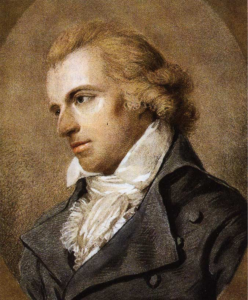Group from Tartarus
(Poet's title: Gruppe aus dem Tartarus)
Set by Schubert:
D 65
Strophe 2
Schmerz verzerret ihr Gesicht
sketch for a canon for TTB[May 11, 1813]
D 396
[March 1816]
D 583
[September 1817]
Horch – wie Murmeln des empörten Meeres,
Wie durch hohler Felsen Becken weint ein Bach,
Stöhnt dort dumpfig tief ein schweres, leeres
Qualerpresstes Ach!
Schmerz verzerret
Ihr Gesicht, Verzweiflung sperret
Ihren Rachen fluchend auf.
Hohl sind ihre Augen – ihre Blicke
Spähen bang nach des Kozytus Brücke,
Folgen tränend seinem Trauerlauf.
Fragen sich einander ängstlich leise,
Ob noch nicht Vollendung sei?-
Ewigkeit schwingt über ihnen Kreise,
Bricht die Sense des Saturns entzwei.
Listen! Like the murmuring of the rebellious sea,
Like a brook crying its way through a hole in hollow rock,
Deep down there in the damp you can hear the groaning of a heavy, empty
Agonised Ahh!
Pain contorts
Their faces. Despair blocks
Their cursing throats.
Their eyes are hollow, they look
Fearfully towards the bridge over Cocytus,
Tearfully following its mournful course.
Softly and anxiously they ask each other
Whether or not it will come to an end.
Eternity hovers over their circle,
Cutting Saturn’s scythe in two.
All translations into English that appear on this website, unless otherwise stated, are by Malcolm Wren. You are free to use them on condition that you acknowledge Malcolm Wren as the translator and schubertsong.uk as the source. Unless otherwise stated, the comments and essays that appear after the texts and translations are by Malcolm Wren and are © Copyright.
☙
Themes and images in this text:
The ancient world Eyes Laments, elegies and mourning Lethe Rivers (Bach) Tears and crying The sea
We are probably more familiar with him as the Grim Reaper, or Old Father Time, but the old man with the scythe is here Saturn, whom Cicero (De Natura Deorum 2, 24) had identified as both Kronos and Chronos. As Kronos he had used a curved blade to emasculate his father, Uranos; as Chronos he had been imprisoned in Tartarus (the abyss) by his son, Zeus.
“ . . . now these immoral fables enshrined a decidedly clever scientific theory. Their meaning was that the highest element of celestial ether or fire [Ouranos the Sky], which by itself generates all things, is devoid of that bodily part which required union with another for the work of procreation. By Saturnus [Kronos] again they denoted that being who maintains the course and revolution of the seasons and periods of time, the deity so designated in Greek, for Saturnus’ Greek name is Kronos, which is the same as khronos, a space of time. The Latin designation ‘Saturnus’ on the other hand is due to the fact that he is ‘saturated’ or ‘satiated with years’ (anni); the fable is that he was in the habit of devouring his sons - meaning that Time devours the ages and gorges himself insatiably with the years that are past. Saturnus is bound by Jove [Zeus] in order that Time’s courses might not be unlimited, and that Jove might fetter him by the bonds of the stars.” (Cicero, English translation H. Rackham, Loeb Classics).
It is this latter point that is called into question by Schiller’s text. On Earth we might benefit from Saturn’s imprisonment, but in Tartaros, the power of time is not restricted at all. Eternity threatens to break Saturn’s scythe in two. There is no prospect of the reaper coming to harvest us. It is we who are fettered, with no hope of the ties that bind us being cut (there are no Fates or Norns cutting the threads of our lives either).
The poem is therefore about the agony of this total absence of hope, in particular the hope that suffering will end. To reinforce this sense of pain, all of the metaphors of suffering are acutely physical. We begin, in the first stanza, with sounds: the terrifying crash of an angry sea, the crying of a small stream being sucked underground, but most of all, deep beneath us, the muffled, struggling human groan that can only be represented as ‘Ach’. This syllable (a whole language, in fact) manages to be both ‘heavy’ and ‘empty’ at the same time.
The second stanza draws our attention to pain contorting the face. The mouth and throat are forever choked. The eyes are hollow and unfocused, looking pointlessly towards the river of wailing, the Cocytus. According to Homer (Odyssey 10, 513), this is a branch of the Styx, the river of death. The agonised inhabitants of Tartaros will never reach this river; Charon has already carried them across. Can this be it? Is there to be no end to it?
☙
Original Spelling Gruppe aus dem Tartarus Horch - wie Murmeln des empörten Meeres, Wie durch hohler Felsen Becken weint ein Bach, Stöhnt dort dumpfigtief ein schweres, leeres Qualerpreßtes Ach! Schmerz verzerret Ihr Gesicht, Verzweiflung sperret Ihren Rachen fluchend auf. Hohl sind ihre Augen - ihre Blicke Spähen bang nach des Kozytus Brücke, Folgen thränend seinem Trauerlauf. Fragen sich einander ängstlich leise: Ob noch nicht Vollendung sey?- Ewigkeit schwingt über ihnen Kreise, Bricht die Sense des Saturns entzwei.
Confirmed by Peter Rastl with Gedichte von Friederich Schiller, Zweiter Theil, Zweite, verbesserte und vermehrte Auflage, Leipzig, 1805, bei Siegfried Lebrecht Crusius, page 150.
First published in Anthologie auf das Jahr 1782, anonymously edited by Schiller with the fake publishing information “Gedrukt in der Buchdrukerei zu Tobolsko”, actually published by Johann Benedict Metzler in Stuttgart. The poem (page 147) has “Y.” as the author’s name.
To see an early edition of the text, go to page 106 [112 von 310] here: http://digital.onb.ac.at/OnbViewer/viewer.faces?doc=ABO_%2BZ207858305


